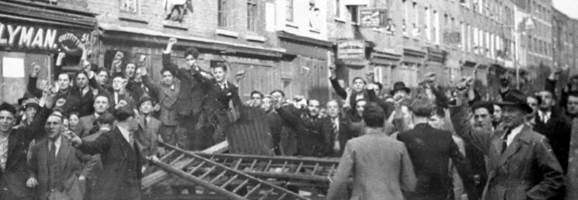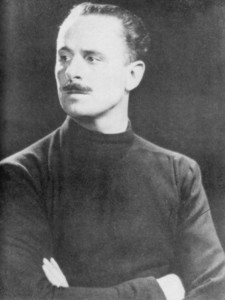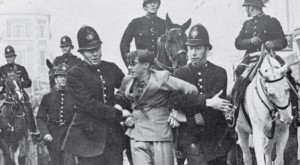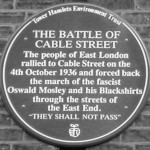
THE BATTLE OF CABLE STREET
In late autumn 1936, an event took place in Cable Street, a nondescript road leading from Leman Street in the East End of London. As the rest of the world braced itself for the outbreak of the Second World War, the Battle of Cable Street in this part of the East End saw scenes of running battles and barricades erected to prevent a march through the area by the British Union of Fascists, led by Oswald Mosley.

Sir Oswald Mosley, the 6th Baronet of Ancoats, was born on the 16th November 1896. He became Member of Parliament for Harrow from 1918 until 1924 and for Smethwick from 1926 to 1931. In 1932, following a disagreement with the then Labour Government’s unemployment policies, he resigned his position and formed the New Party which in turn merged with the British Union of Fascists.
Mosley spent a large part of his private fortune on the British Union of Fascists and tried, through close associations with Nazi Germany and Adolf Hitler to set up a British speaking commercial radio station to broadcast propaganda from Germany.
Mosley had instituted a body of black uniformed paramilitary followers – nicknamed The Blackshirts. This corps of individuals served to oversee the BUF party meetings, and they were frequently involved in violent confrontations, particularly with Jewish and other immigrant groups.
The Battle of Cable Street took place on Sunday 4 October 1936, when Mosley led a march into this area of London, which had a high immigrant population. It led to a clash between the Metropolitan Police, who were overseeing the march, and anti-fascists, including local Jewish, socialist, anarchist, Irish and communist groups. The majority of both marchers and counter-protesters had travelled into the area for the purpose of causing as much disruption as possible.
Despite being aware that there was the strong likelihood for violence to break out, the government decided not to ban the march and sent in 6000 Police Officers in an attempt to prevent any disruption of the gathering. However, they were met by around 100,000 anti-fascist protesters.

The anti-fascist groups built roadblocks and barricades near the junction with Christian Street in an attempt to prevent the march from taking place. The demonstrators fought with improvised weapons such as sticks, rocks, and even chair legs, and the women in the houses along the street contributed to the riot by throwing rubbish, rotten vegetables and the contents of chamber pots at the police. After a series of running battles, Sir Philip Game, the Police Commissioner disallowed the march from going ahead and both Mosley and the BUF abandoned it to prevent further bloodshed.

Many demonstrators were arrested and while most were charged with the minor offence of obstructing police and fined £5, several of the ringleaders were found guilty of affray and sentenced to 3 months hard labour. The Battle of Cable Street was a major factor leading to the passage of the Public Order Act 1936, which required police consent for political marches and forbade the wearing of political uniforms in public.
